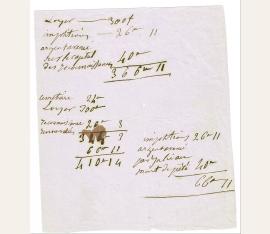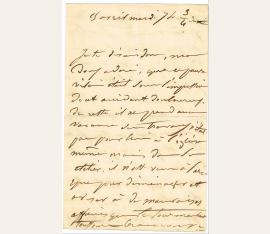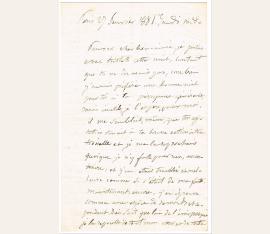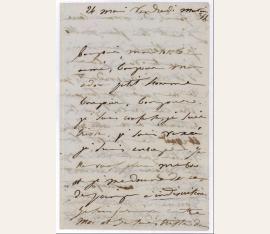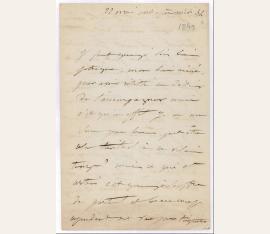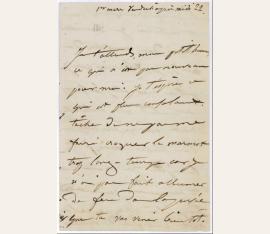French actress and mistress of Victor Hugo (1806–1883). Autograph note. no place, no date. 8vo. 1 page. Blue paper.
1.500 €
(44309)
Receipt of the expenses of the mistress of Victor Hugo, including 24f for the cemetery, likely St Mandé, where her 20-year-old daughter, Claire Pradier, was buried in 1846. Victor Hugo, who was shattered by his own daughter’s death in 1843, engraved the tombstone for Claire. Juliette Drouet, who survived this tragedy by almost 40 years, is buried next to her. Other expenses mentioned on this brief note include rent (300f), as well as payments at a pawn shop (40f).
French actress and mistress of Victor Hugo (1806–1883). Autograph letter signed, to Victor Hugo. no place. 8vo. 4 pages.
4.500 €
(44356)
To Victor Hugo on the sculptor Victor Vilain, the lover of her cousin Eugénie, complaining about his heavy workload preventing him from attending church, as well as his visit to Paris having the sole purpose of organizing his move. She brings up Vilain’s promise that he will have Julie visit him in a month’s time, hoping he will keep his word, and lets him know that Vilain enquired about his and his family’s health. She concludes with her being available until the end of the month, mentioning a social event at Madame de Montferrier’s on Good Friday, where she hopes to meet him too.
Actrice française, maitresse de Vi^ctor Hugo (1806-1883). Autograph letter to Victor Hugo. Paris. 8vo. 3 pages.
8.500 €
(44550)
Emotional letter to Victor Hugo about her wish that they should live the exact same number of days, bringing up a miserable night where he was suffering from insomnia and she was blaming herself. About a letter of Lerry cancelling his visit as he has to preside a banquet, and urging him to hurry if he wants to have lunch with Jeanne and still be at the Academy and the Senate on time. She concludes with a complaint about the weather, which however matches her own darkness, mentions not to reread her letter for fear she might burn it right away, and announces a billet by Angèle Magnin, which she will bring by his house to make up for what her own letter lacks in style.
– In 1881 Drouet’s life had taken a turn for the worse. She was terribly worried by Victor Hugo’s health, and was suffering from stomach cancer herself, knowing that she was to die of starvation. On 11 May 1883 she died in her Paris apartment. She was buried at Saint Mandé cemetery next to her daughter Claire Pradier. In 1883 Victor Hugo only entered a single phrase in his diary: “I’ll rejoin you soon, my dearly beloved”..
actrice française et la maîtresse de Victor Hugo (1806-1883). Lettre autographe signée ("Juliette"). S. l. 4 pages in-8.
9.500 €
(45290/BN31623)
À Victor Hugo. Belle lettre d'une amoureuse délaissée. Elle est "confuse, triste, vexée, enragée", et elle se donne des coups de poings "à indiscrétion": "Je ne te vois plus, mon Toto, je ne t'occupe pas mais je ne te vois plus. Il est clair, cependant, que ce ne peut pas toujours être ton travail qui te retienne avec cette régularité ce sont bien plutôt les visites que tu fais et que tu reçois qui en sont la cause. Autrefois tu donnais moins de temps aux devoirs du monde et tu en donnais davantage à l'amour.
Tu travaillais autant, si non plus, et j'étais plus heureuse. L'hiver je peux passer les nuits entières en veillant l'été je ne le peux pas; dès qu'arrive une heure du matin mes yeux se ferment malgré moi. Comment faire alors pour te voir puisque tu ne viens guère qu'à ce moment-là? Je ne me coucherai pas, je tiendrai mes croisées ouvertes et je prendrai du café pour m'empêcher de dormir. De cette façon, je pourrai au moins profiter des quelques minutes que tu peux me donner. Je commencerai ce régime ce soir [...]"..
actrice française et la maîtresse de Victor Hugo (1806-1883). Lettre autographe signée ("Juliette"). [Paris]. 4 pages in-8.
9.500 €
(45291/BN31624)
À Victor Hugo. Charmante lettre où elle se plaint avec humour d'embarras gastriques. Elle supporterait son petit malaise avec plus de courage s'il était là pour la dorloter. "[...] Je m'en veux presque maintenant d'avoir sacrifié mon coeur à mon ventre une autre fois je ne ferai pas de ces stupides concessions-là et il s'en tirera comme il pourra et ces borborigmes aussi. Tiens qu'est-ce qu'ils me veulent donc ceux-là? Quand je vous dis qu'il n'y a plus de petits boyaux voici les miens qui veulent faire autant de bruit que les vôtres, les ambitieux.
Voulez-vous bien vous taire tout de suite je n'aime pas les maux si tapageurs que ça [...]". Elle n'est cependant pas malade: "je t'aime trop voilà tout. Le reste c'est pure imitation et pour faire comme les grands boyaux. Je t'adore envers et contre tout [...]"..
actrice française et la maîtresse de Victor Hugo (1806-1883). Lettre autographe signée ("Juliette"). S. l. 4 pp. in-8.
9.500 €
(45292/BN31625)
À Victor Hugo. Belle lettre d'amour à son "cher Toto" dans laquelle elle évoque l'appel à la conscription du cadet de Victor Hugo. Dans ses multiples lettres d'amour, Juliette Drouet se comportait bien autrement qu'une simple maîtresse, mais en femme attentive à tout ce qui touchait son bien-aimé, montrant ainsi sa sensibilité et son intelligence. Ici elle attend son "petit homme" et lui demande ne pas lui "faire croquer le marmot trop longtemps". Elle demande des nouvelles de Madame de Montferrier, une amie de Victor Hugo qui avait été témoin du mariage de l'écrivain, et qu'elle a quittée hier.
Elle s'inquiète aussi du sort de François-Victor, le fils cadet d'Hugo qui doit, conformément à la pratique de l'époque, tirer au sort un numéro décidant de son incorporation ou non au service militaire. Elle lui demande: "N'est-ce pas aujourd'hui que ton fils tire à la conscription? Si cela était il est probable que tu resteras chez toi jusqu'au moment où il rapportera son n° de la mairie. Pourvu qu'il ait le bon esprit de tirer le n° 1 il en est fort capable et je lui en fais d'avance mon compliment. Voime, voime, mais je suis sûre que tu aimerais mieux les trois portières chinoises? Tu es si difficile à contenter toi. Quant à moi ce que je préfère à tout les bric-à-bracs même au n° 1 de Toto c'est votre coeur ce qui est bien autrement fantastique que toutes les chinoiseries et les bonnes chances du monde [...]". L'allusion au "n° 1" que Juliette Drouet souhaite que tire François-Victor fait référence au complexe système de tirage au sort en vigueur pour la conscription militaire au XIXe siècle. De ce tirage au sort dépendait la durée du service militaire qui variait de six mois à un an, avec des possibilités d'exemption..

